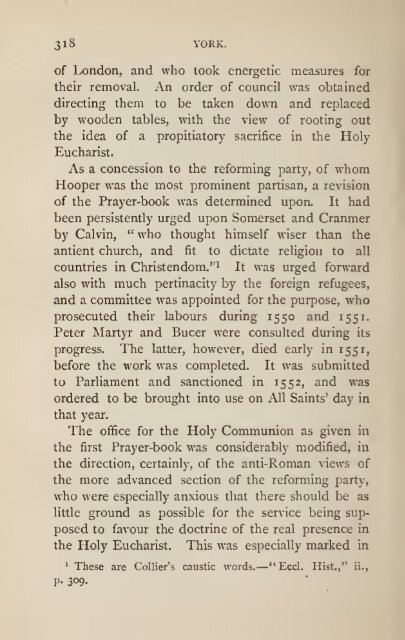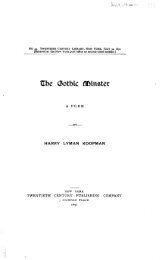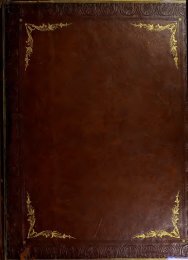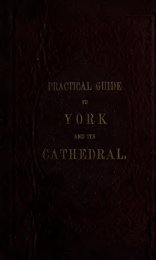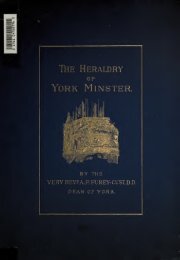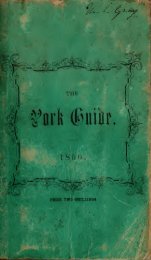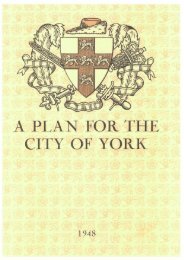- Page 1:
-^ 7
- Page 7 and 8:
Digitized by tine Internet Archive
- Page 9 and 10:
DIOCESAN HISTQ. V Y O R JUL 2 inr;5
- Page 11 and 12:
' "Points YORK. CHAPTER I. INTRODUC
- Page 13 and 14:
INTRODUCTORY. 3 may, however, be no
- Page 15 and 16:
INTRODUCTORY. 5 able river, and it
- Page 17 and 18:
INTRODUCTORY. 7 been explored, more
- Page 19 and 20:
INTRODUCTOEY. 9 of the great capita
- Page 21 and 22:
' A INTRODUCTORY. sovereignty. At t
- Page 23 and 24:
YORK. '3 CHAPTER II. Christianity w
- Page 25 and 26:
; PAULINUS. 15 following, and he pr
- Page 27 and 28:
— KING Edwin's conversion. 17 lis
- Page 29 and 30:
9 EDWIX'S BASILICA AT YORK. 1 futur
- Page 31 and 32:
MISSIONARY LABOURS OF PAULINUS. 21
- Page 33 and 34:
EDWIN FALLS IN BATTLE. 23 exorcised
- Page 35 and 36:
FLIGHT OF QUEEN ETHELBURGA. 25 lute
- Page 37 and 38:
S. OSWALD, KING AND MARTYR. 27 the
- Page 39 and 40:
OSWALD'S CARE FOR HIS PEOPLE. 29 he
- Page 41 and 42:
S. AIDAN. 31 abbot, chosen by the b
- Page 43 and 44:
OSWALD SLAIN AT MASERFIELD. 33 Edwi
- Page 45 and 46:
MURDER OF KIXG OSWIN. 35 succeeded
- Page 47 and 48:
OSWY'S remorse.—SCOTIC CHURCH. 37
- Page 49 and 50:
CONVERSION OF PEADA. 39 Roman pract
- Page 51 and 52:
YORK. CHAPTER IV. With the conversi
- Page 53 and 54:
' MONASTERIES OF NORTHUMBRIA. 43 sw
- Page 55 and 56:
s. Wilfrid's karlv history. the Psa
- Page 57 and 58:
WILFRID ABBOT OF RIPON. 47 onwards
- Page 59 and 60:
SVXOD OF VVHIIIiY. 49 abbess, Hilda
- Page 61 and 62:
SYNOD OF WHITBY. 51 "Were these wor
- Page 63 and 64:
YORK. 53 CHAPTER V. Besides the tri
- Page 65 and 66:
ARCHBISHOP THEODORE. 55 by one who
- Page 67 and 68:
S. CHAD.—WILFRID AT YORK. 57 lie
- Page 69 and 70:
1 DISCUSSION BETWEEN WILFRID AND EC
- Page 71 and 72:
63 going on, and (luickly appeared
- Page 73 and 74:
WILFKID THROWN INTO PRISON. 65 bish
- Page 75 and 76:
HILDA.— CAUmO'S. 67 awkward shyne
- Page 77 and 78:
YORK. 69 CHAPTER VI. [a.d. 681.] We
- Page 79 and 80:
S. CUTHBERT CONSECRATED AT YORK. 7
- Page 81 and 82:
WILFRID'S CONVERSION OF THE ISLE OF
- Page 83 and 84:
WILFRIDS CONVERSION OF THE ISLE OF
- Page 85 and 86:
WILFRIDS RETURN TO NORTHUMBRIA. 75
- Page 87 and 88:
— WILFRID AI'I'EALS AGAIN TO ROME
- Page 89 and 90:
WILFRID RETURNS TO ENGLAND. 79 in b
- Page 91 and 92:
1 WILI RIl/S DEATH, AND CHARACTER.
- Page 93 and 94:
Wilfrid's character. 83 version of
- Page 95 and 96:
S. JOHN OF BEVERLEY. 8S wood, in co
- Page 97 and 98:
KEDE's LEITER TO EGBERT. 87 dence f
- Page 99 and 100:
ALCUIN.—CANONS OF YORK. 89 of the
- Page 101 and 102:
The 1 SECULAR CANONS.—SCHOOL OF Y
- Page 103 and 104:
EANBALD.— EANBALD II. 93 Saxon sc
- Page 105 and 106:
YORK. 95 CHAPTER VIII. In tracing t
- Page 107 and 108:
ALFRED THE GREAT. ATHELSTAN. 97 val
- Page 109 and 110:
DANISH BISHOPS.—STATE OF YORK. 99
- Page 111 and 112:
WULSTAN II.—ALFRIC PUTTOC. KINSIU
- Page 113 and 114:
ARCHBISHOP ALDRED. I03 rebuilt the
- Page 115 and 116:
INDEPENDENCE OF ALDREd's CHARACIER.
- Page 117 and 118:
YORK. 107 CHAPTER IX. With Aldred's
- Page 119 and 120:
THOMAS OF BAVEUX. 109 from bishop a
- Page 121 and 122:
RE-ORGANISATION OF THE MINSTER. Ill
- Page 123 and 124:
DISTRICTS ASSIGNED TO ARCHDEACONS.
- Page 125 and 126:
RESTORATION OF BENEDICTINE RULE. II
- Page 127 and 128:
STATE OF CHURCH UNDER NORMAN RULE.
- Page 129 and 130:
GERARD.—THOMAS II. II9 minster ne
- Page 131 and 132:
THOMAS 11. and furnishes little tha
- Page 133 and 134:
— THURSTAN. 123 receive priest's
- Page 135 and 136:
BATTLE OF THE STANDARD. I25 and pow
- Page 137 and 138:
THE CISTERCIANS. 127 teaux, the yet
- Page 139 and 140:
— ORIGIN OF FOUNTAINS ABBEY. 1 29
- Page 141 and 142:
S. WILLIAM OF YORK. I3I although th
- Page 143 and 144:
CONFLICT BETWEEN YORK AND CANTERBUR
- Page 145 and 146:
ROGER DE PONT L'EVEQUE. Roger had a
- Page 147 and 148:
GEOFFRY PLANTAGENET. Archbishop rai
- Page 149 and 150:
DEATH OF ARCHBISHOP GEOFFRY. 139 in
- Page 151 and 152:
WALTER DE GRAY. 141 king. The clerg
- Page 153 and 154:
^ WALTER DE GRAY's WORK. 143 went o
- Page 155 and 156:
DEALS WITH ABUSES OF PATRONAGE. I45
- Page 157 and 158:
GRAV'S WORK AT THE MINSTER. 147 rev
- Page 159 and 160:
; HOSPITALS. 149 doubtedly the inte
- Page 161 and 162:
STATE OF THE MONASTIC ORDERS. 151 a
- Page 163 and 164:
THE FRANCISCANS. 153 of all episcop
- Page 165 and 166:
; THE FRIARS AS PREACHERS. 155 the
- Page 167 and 168:
YORK. 157 CHAPTER XII. Little of in
- Page 169 and 170:
FABRIC FUND OF MINSTER. 159 its com
- Page 171 and 172:
ROMANUS. i6i settled by arbitration
- Page 173 and 174:
ENFORCEMENT OF DISCIPLINE. 1 63 onl
- Page 175 and 176:
WILLIAM LA ZOC'CHE. 165 always be r
- Page 177 and 178:
RICHARD ROLLE. 167 Richard of Hampo
- Page 179 and 180:
JOHN DE THORESUY. 169 England, and
- Page 181 and 182:
JOHN DE THORESEV. 171 every Lent. T
- Page 183 and 184:
thoresby's work at the minster. 173
- Page 185 and 186:
JOHN WVCLIFFE. instituted to the re
- Page 187 and 188:
JOHN WYCLIFFE. 177 appeared before
- Page 189 and 190:
JOHN WVCLIFFE. But Wycliffe assaile
- Page 191 and 192:
IHE PEASANT REVOLT. i8i transubstan
- Page 193 and 194:
THE LOLLARDS. rural society in Engl
- Page 195 and 196:
— THE CARTHUSIANS. not the teachi
- Page 197 and 198:
CHURCH ARCHITECTURE. 187 Whatever m
- Page 199 and 200:
ALEXANDER NEVILE. that he received
- Page 201 and 202:
RICHARD SCROPE. 191 Castle, which s
- Page 203 and 204:
' A RICHARD SCROPE. without a saddl
- Page 205 and 206:
RICHARD SCROPE. 195 contributed to
- Page 207 and 208:
lilSUOP SKIRLAW's WORK AT YORK. I97
- Page 209 and 210:
COMPLETION OF THE MiXSTER. 199 reco
- Page 211 and 212:
GEORGE NEVILLE. 201 those who were
- Page 213 and 214:
GEORGE NEVILLE. 203 in a hostile pa
- Page 215 and 216:
'' GILDS. 205 neiglibourly duties a
- Page 217 and 218:
GILDS. 207 architecture of that per
- Page 219 and 220:
GILDS. 209 the Church of the Friars
- Page 221 and 222:
VOWESSES. world, or regarded in any
- Page 223 and 224:
CONDITION OF PARISH CHURCHES. 213 t
- Page 225 and 226:
CONDITION OF PARISH CHURCHES. 215 y
- Page 227 and 228:
THOMAS ROTHERHAM. 217 in his will h
- Page 229 and 230:
EARLY PRINTING AT YORK. 219 needles
- Page 231 and 232:
THE NEW LEARN'ING. 221 The importin
- Page 233 and 234:
COLET. 223 from his foreign travels
- Page 235 and 236:
COLET. 22S graphically narrated by
- Page 237 and 238:
DISIIOP FISHER. 227 he vindicated ;
- Page 239 and 240:
WOLSEY. 229 versation on the part o
- Page 241 and 242:
WOLSEY. manner All Souls and Magdal
- Page 243 and 244:
woLSEy. 233 utilized in two directi
- Page 245 and 246:
YORK. CHAPTER XVII. Whatever Wolsey
- Page 247 and 248:
WOLSEV. Here lie took up his abode,
- Page 249 and 250:
THE DIVORCE QUESTIO.V. business tra
- Page 251 and 252:
1 APPEALS TO THE POPE FORBIDDEN. 24
- Page 253 and 254:
FATE OF FISHER AND MORE. 243 bury d
- Page 255 and 256:
THE ABBOT OF FOUNTAINS. Layton writ
- Page 257 and 258:
MORALS OF THE CLERGY. 247 find, for
- Page 259 and 260:
INJUN'CTIONS ABOUT PREACHING. 249-
- Page 261 and 262:
CHAPTER XVIII. The movement which f
- Page 263 and 264:
— PILGRIMAGE OF GRACE. 253 from t
- Page 265 and 266:
ASKE BECOMES LEADER. formidable pro
- Page 267 and 268:
SKIPTON CASTLE BESIEGED. were sworn
- Page 269 and 270:
CONFEREN'CE AT DONCASTER. 259 to th
- Page 271 and 272:
PARLIAMENT AT PONTEFRACT. 261 The k
- Page 273 and 274:
INTERVIEW OF ASKE WITH THE KING. 26
- Page 275 and 276:
DISPERSION OF THE INSURGENTS. 265 T
- Page 277 and 278: — FATE OF LORD DARCV, ASKE, ETC.
- Page 279 and 280: YORK. 269 CHAPTER XIX. There can be
- Page 281 and 282: FALL OF THE GREATER MONASTERIES. 27
- Page 283 and 284: —; FOUNTAINS ABBEY. ^998. 6s. yd.
- Page 285 and 286: A BISHOPRIC OF FOUNTAINS PROJECTED.
- Page 287 and 288: PARISH REGISTERS ORDERED. 277 churc
- Page 289 and 290: BREAKING VV OV MONASTIC PROPERTY. 2
- Page 291 and 292: 1 OVERTURES OF Gl-UMAN REFORMERS. 2
- Page 293 and 294: PERSECUTION IN THE DIOCESE OF YORK.
- Page 295 and 296: MANUALS OF DOCTRINE AND DEVOTION. 2
- Page 297 and 298: PRIMERS. BIDDING PRAYER. 287 the na
- Page 299 and 300: NEW STATUTES FOR YORK MINSTER. 289
- Page 301 and 302: — 1 PALLIUM GIVEN BY CRANMER, 29
- Page 303 and 304: ' ^ DEAN AND CHAPTER OF RIPON. 293
- Page 305 and 306: ; THE USE OF YORK. York Use, Canon
- Page 307 and 308: — THE USE OF YORK. 297 Sarum rite
- Page 309 and 310: — ; THE USE OF YORK. But the most
- Page 311 and 312: — THE USE OF YORK. 301 people in
- Page 313 and 314: ' THE YORK USE. Aug. Hilda;, viii K
- Page 315 and 316: THE YORK USE. of great antiquity, t
- Page 317 and 318: CARDINAL QUIGNON'S BREVIARY. 307 Th
- Page 319 and 320: EDWARD VI. 'S INJUNCTIONS. put in a
- Page 321 and 322: ; enough. ACTS OF PARLIAMENT IN 1 5
- Page 323 and 324: QUESTION OF CLERICAL CELIBACY. 313
- Page 325 and 326: FIRST PRAYER-BOOK OF EDWARD VI. 3 1
- Page 327: VESTMENT CONTROVERSY. Aiignstanuni,
- Page 331 and 332: holgate's injunctions. 321 as all t
- Page 333 and 334: holgate's injunctions. 323 and redd
- Page 335 and 336: YORK. CHAPTER XXII. After the death
- Page 337 and 338: REFORMERS GO INTO EXILE. 3-7 might
- Page 339 and 340: THE MARIAN PERSECUTION. of Dr. Ling
- Page 341 and 342: HEATH BECOMES ARCHBISHOP. 331 any r
- Page 343 and 344: Elizabeth's accession. 333 nation w
- Page 345 and 346: REVISION OF COMMON PRAYER. 335 and
- Page 347 and 348: while, REVISION OF EDWARD VI. 's AR
- Page 349 and 350: OBJECTIONS TO THE PRAYER-BOOK. 339
- Page 351 and 352: REBELLION OF 1569. sons gathered ro
- Page 353 and 354: REHEI.t.ION OF 1569. sons gathered
- Page 355 and 356: " REBELLION OF I569. 343 surgents t
- Page 357 and 358: DISPERSION OF THE INSURGENTS, 345 b
- Page 359 and 360: ARCHBISHOP GRINDAL. 347 about two y
- Page 361 and 362: grindal's injunctions. 349 had been
- Page 363 and 364: grindal's policy. 35t gation, so to
- Page 365 and 366: THE COLLEGE AT DOUAY. 353 to the ex
- Page 367 and 368: PENAL STATUTES. 355 marks, and be i
- Page 369 and 370: SEVERE TREATMENT OF ROMANISTS. 357
- Page 371 and 372: SERMONS PREACHED TO RECUSANTS. 359
- Page 373 and 374: YORK. CHAPTER XXIV. Every reader of
- Page 375 and 376: ARCHBISHOP SANDYS. retained a suffi
- Page 377 and 378: SANDYS. PIERS.— HUTTON. 365 the a
- Page 379 and 380:
COLLEGIATE CHURCH OF RIPOX. 367 The
- Page 381 and 382:
: ARCHBISHOP MATHEW. by the death o
- Page 383 and 384:
cosin's visitation articles. 371 Ar
- Page 385 and 386:
ARCHBISHOP NEH.E. 373 Bethel, whose
- Page 387 and 388:
— FOREIGN SETTLERS IN YORKSHIRE.
- Page 389 and 390:
CHARI.KS l.'s IXTERKST IN CHURCH MA
- Page 391 and 392:
ROVAL LETTER TO CHAPTER OF YORK. 37
- Page 393 and 394:
ARCHBISHOP NEILE's POLICY. had been
- Page 395 and 396:
; NEILE ADVOCATES PERSECUTIOX. 383
- Page 397 and 398:
THE WESTMINSTER ASSEMBLY. 387 who h
- Page 399 and 400:
USE OF THE PRAYER-BOOK FORBIDDEN. 3
- Page 401 and 402:
' See RESTORATION OF CHARLES II. in
- Page 403 and 404:
' ACT OF UNIFORMITY PASSED. 393 The
- Page 405 and 406:
' Canon RESULTS OF ACT OF UNIFORMIT
- Page 407 and 408:
CONVENTICLE AND TEST ACTS. 397 his
- Page 409 and 410:
ARCHBISHOP DOLBEN. 399 matically pu
- Page 411 and 412:
DECLARATION FOR LIBERTY OK CONSCIEN
- Page 413 and 414:
ARCHBISHOP LAMPLUGH. 403 wrested it
- Page 415 and 416:
' The YORK. CHAPTER XXVI. The acces
- Page 417 and 418:
' Life tillotson's scheme for compr
- Page 419 and 420:
THE CHURCH IN THE LAST CENTURY. 409
- Page 421 and 422:
JOHN Wesley's work. 411 by the cler
- Page 423 and 424:
CATHEDRALS ACTS.—CONVOCATION. 413
- Page 425 and 426:
BISHOPS LIST OF AND ARCHBISHOPS OF
- Page 427 and 428:
I ; ] ; INDEX. ACCA, accompanies Wi
- Page 429 and 430:
\ 74 j 1 Bosham, t BoWF.T, ; INDEX.
- Page 431 and 432:
j i founds I I Collegiate I ; INDEX
- Page 433 and 434:
; ;, Dorchester, 66 Douay, college
- Page 435 and 436:
j I | ] i j ; INDEX. 425 founding a
- Page 437 and 438:
espect paid him by Elizaj INDEX. 42
- Page 439 and 440:
INDEX. and Mary, 406 ; Iiis death,
- Page 441 and 442:
dealings with foreign settlers in H
- Page 443 and 444:
eport of his diocese, 37S 1 ! tempt
- Page 445 and 446:
1 INDEX. 435 rally in Southern I'ro
- Page 447 and 448:
; INDEX. 437 Tillotson, appointed t
- Page 449 and 450:
109, 117 ; hisattitude towards the
- Page 451 and 452:
PUBLICATIONS OF THE Society for Pro
- Page 453 and 454:
FOR PROMOTING CHRISTIAN KNOWLEDGE.
- Page 458:
BW5232 .Y607 York. 1 1012 00017 819


